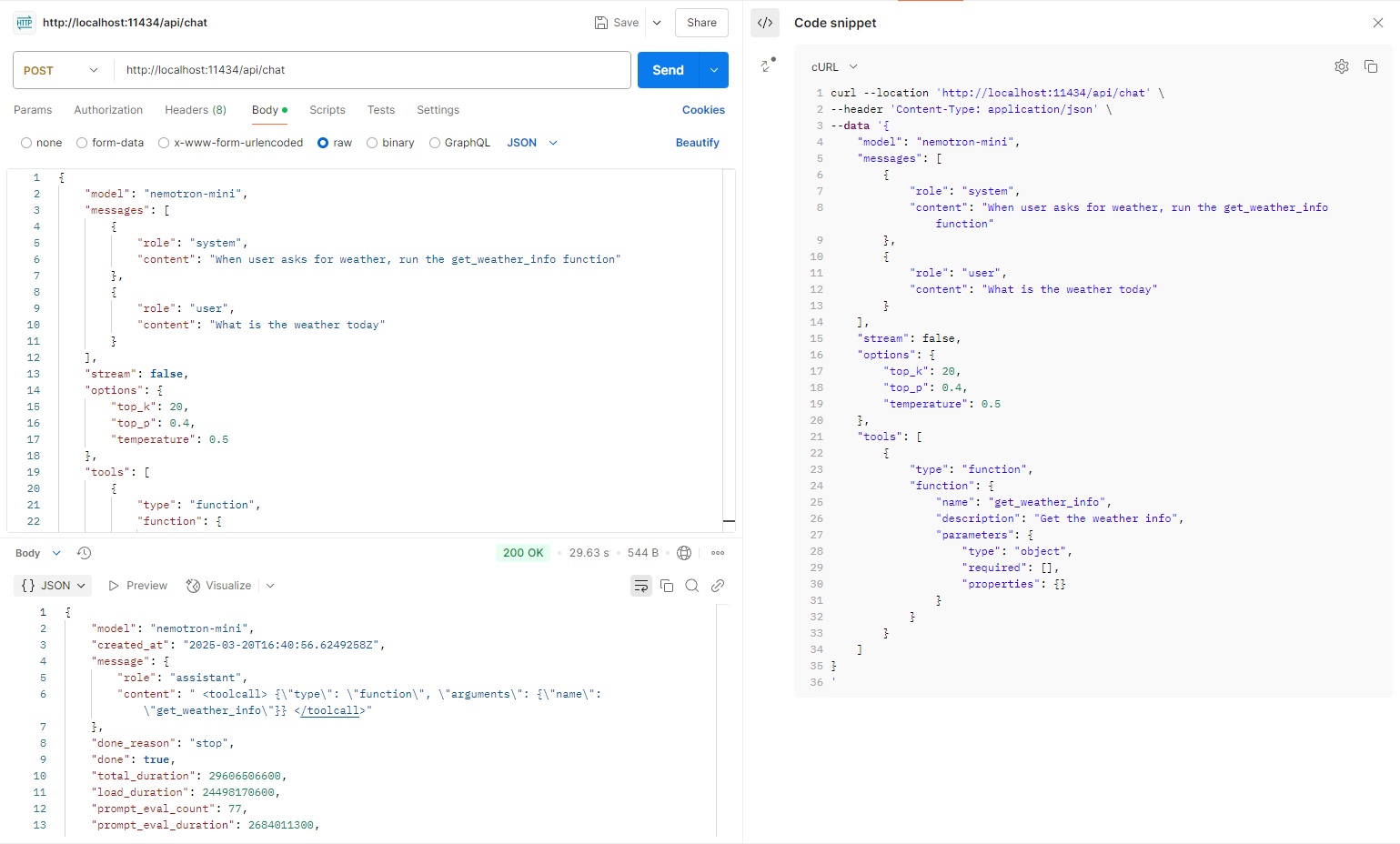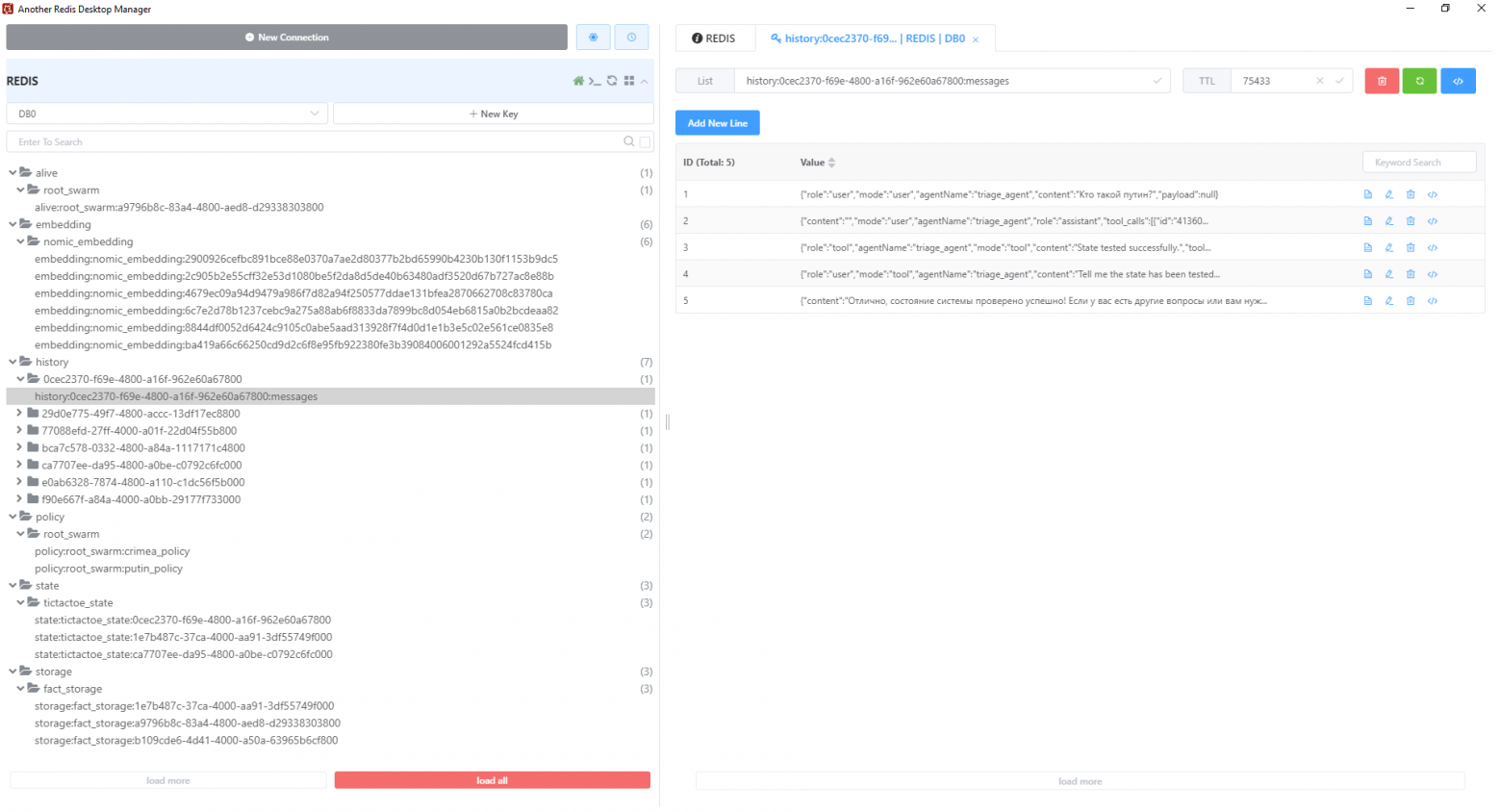Orchestrating LLM Model Chats via Redis
When working with language models, a common phenomenon is hallucinations—when the model provides incorrect conclusions. This is due to the limitations of the mathematical model, which introduces important nuances discussed in this article.
 Caption: Incorrect tool invocation protocol when attempting to run NVidia Nemotron Mini on Ollama
Caption: Incorrect tool invocation protocol when attempting to run NVidia Nemotron Mini on Ollama
In addition to hallucinations, there is currently no unified standard for tools: an XML template that the language model uses to interact with external integrations. In the image above, instead of a structured weather tool invocation, the model sent an unclear XML with the tag <toolcall> directly to the user.
Key Insights
-
You cannot trust a language model to pass an ID directly into tool arguments
To generate diverse responses, language models useseedandtemperature—the initial value of a pseudo-random number generator and a percentage determining how often the next token is chosen randomly. In other words, the model is mathematically inclined to pass you a random document ID. -
When filling out forms with more than one field, you cannot assume the model will populate the data from the conversation itself
First, open-source datasets for training models do not include examples of filling out complex forms. Second, to avoid overflowing the context, message rotation is necessary. Third, if a model hallucination is detected (e.g., XML code in a user response), the only way to recover is to clear the conversation history. -
During message rotation, it’s critical to ensure the system prompt isn’t lost
According to the OpenAI specification, a message in the conversation must have aroleequivalent to one of the following:"assistant"(message from the language model),"system"(instructions for the model’s behavior),"tool"(tool invocation result), or"user"(message from the user). Deleting"system"messages during rotation will break the agent’s business logic, and"tool"messages with tool execution results should be removed alongside the corresponding"assistant"message request, and vice versa.
Minimum Set of Primitives
To address the points mentioned above, the following primitives should be applied:
-
PersistStorage
Instead of passing an element’s ID as a filter for every interaction with a list, you should use sorting to select the most suitable item based on asimilarity scorefrom its description viavector search. -
PersistState
Intermediate form-filling results need to be stored in a separate storage from the message history, as the latter must be reset if the model starts hallucinating. -
PersistEmbedding
Requests to compute vector embeddings for list item descriptions are paid. Calculating the similarity score for strings in RAG works as follows: feature matrices are computed for the two strings being compared (once per string), then cosine similarity provides a match percentage from 0.0 to 1.0. To avoid redundant requests, computed vector values should be stored in a dictionary where the key is the hash of the original string.
Additional Primitives
Beyond this, to make the chat functional, the following primitives are needed:
-
PersistAlive
A flag indicating whether the language model’s interlocutor is online. This is critical for scheduling system maintenance. -
PersistMemory
Similar to the context of an HTTP request, an arbitrary key-value dictionary where, for example, the user’s locale can be stored. -
PersistPolicy
If someone asks, “Whose Crimea is it?” they should simply be banned—they’re not intending to pay.I know for sure that ChatGPT is OpenAI, and I pay them for tokens. -
PersistSwarm
When navigating a swarm of agents, the navigation stack must be preserved fornavigate backfunctionality, and the current active agent must be saved to reload the system without state desynchronization.
Code Example
The resulting structure will look like this:
 Caption: Another Redis Desktop Manager,
Caption: Another Redis Desktop Manager, same thing but without the flag
Here’s a segment of the source code for reference. You can explore the full project here. It’s a fully functional chat, and the technology works.
import {
PersistAlive,
PersistMemory,
PersistPolicy,
PersistState,
PersistStorage,
PersistSwarm,
PersistEmbedding,
History,
type IHistoryInstance,
type IModelMessage,
type IPersistBase,
type IPersistActiveAgentData,
type IPersistNavigationStackData,
type IPersistStateData,
type IPersistStorageData,
type IPersistMemoryData,
type IPersistPolicyData,
type IPersistAliveData,
type IPersistEmbeddingData,
setConfig,
} from "agent-swarm-kit";
import { singleshot } from "functools-kit";
import Redis from "ioredis";
setConfig({
CC_PERSIST_EMBEDDING_CACHE: true,
});
declare function parseInt(s: unknown): number;
const EMBEDDING_REDIS_TTL = 604800; // 1 week
const HISTORY_REDIS_TTL = 86400; // 24 hours
const ALIVE_REDIS_TTL = 3600; // 1 hour
const getRedis = singleshot(
() =>
new Promise<Redis>((res) => {
const redis = new Redis({
host: process.env.CC_REDIS_HOST || "127.0.0.1",
port: parseInt(process.env.CC_REDIS_PORT) || 6379,
password: process.env.CC_REDIS_PASSWORD || "",
});
redis.on("connect", () => {
res(redis);
});
redis.on("error", (error) => {
throw error;
});
redis.on("close", () => {
throw new Error("redis connection closed");
});
return redis;
})
);
History.useHistoryAdapter(
class implements IHistoryInstance {
private _redis: Redis = null as never;
private _messages: IModelMessage[] = [];
async *iterate(): AsyncIterableIterator<IModelMessage> {
for await (const message of this._messages) {
yield message;
}
}
constructor(public readonly clientId: string) {}
public waitForInit = singleshot(async () => {
this._redis = await getRedis();
const messages = await this._redis.lrange(
`history:${this.clientId}:messages`,
0,
-1
);
this._messages = messages.map((msg) => JSON.parse(msg) as IModelMessage);
});
async push(value: IModelMessage): Promise<void> {
const key = `history:${this.clientId}:messages`;
await this._redis.rpush(key, JSON.stringify(value));
await this._redis.expire(key, HISTORY_REDIS_TTL);
this._messages.push(value);
}
async pop(): Promise<IModelMessage | null> {
const key = `history:${this.clientId}:messages`;
await this._redis.lpop(key);
return this._messages.pop() ?? null;
}
async dispose() {
this._messages = [];
}
}
);
PersistSwarm.usePersistActiveAgentAdapter(
class implements IPersistBase<IPersistActiveAgentData> {
private _redis: Redis = null as never;
constructor(private readonly swarmName: string) {}
public waitForInit = singleshot(async () => {
this._redis = await getRedis();
});
async readValue(clientId: string): Promise<IPersistActiveAgentData> {
const key = `swarm:${this.swarmName}:active_agent:${clientId}`;
const value = await this._redis.get(key);
if (!value) {
throw new Error(`PersistActiveAgent ${clientId} not found.`);
}
return JSON.parse(value) as IPersistActiveAgentData;
}
async hasValue(clientId: string): Promise<boolean> {
const key = `swarm:${this.swarmName}:active_agent:${clientId}`;
const exists = await this._redis.exists(key);
return exists === 1;
}
async writeValue(
clientId: string,
entity: IPersistActiveAgentData
): Promise<void> {
const key = `swarm:${this.swarmName}:active_agent:${clientId}`;
await this._redis.set(key, JSON.stringify(entity));
}
}
);
PersistSwarm.usePersistNavigationStackAdapter(
class implements IPersistBase<IPersistNavigationStackData> {
private _redis: Redis = null as never;
constructor(private readonly swarmName: string) {}
public waitForInit = singleshot(async () => {
this._redis = await getRedis();
});
async readValue(clientId: string): Promise<IPersistNavigationStackData> {
const key = `swarm:${this.swarmName}:navigation_stack:${clientId}`;
const value = await this._redis.get(key);
if (!value) {
throw new Error(`PersistNavigationStack ${clientId} not found.`);
}
return JSON.parse(value) as IPersistNavigationStackData;
}
async hasValue(clientId: string): Promise<boolean> {
const key = `swarm:${this.swarmName}:navigation_stack:${clientId}`;
const exists = await this._redis.exists(key);
return exists === 1;
}
async writeValue(
clientId: string,
entity: IPersistNavigationStackData
): Promise<void> {
const key = `swarm:${this.swarmName}:navigation_stack:${clientId}`;
await this._redis.set(key, JSON.stringify(entity));
}
}
);
PersistState.usePersistStateAdapter(
class implements IPersistBase<IPersistStateData> {
private _redis: Redis = null as never;
constructor(private readonly stateName: string) {}
public waitForInit = singleshot(async () => {
this._redis = await getRedis();
});
async readValue(clientId: string): Promise<IPersistStateData<unknown>> {
const key = `state:${this.stateName}:${clientId}`;
const value = await this._redis.get(key);
if (!value) {
throw new Error(`PersistState ${clientId} not found.`);
}
return JSON.parse(value) as IPersistStateData<unknown>;
}
async hasValue(clientId: string): Promise<boolean> {
const key = `state:${this.stateName}:${clientId}`;
const exists = await this._redis.exists(key);
return exists === 1;
}
async writeValue(
clientId: string,
entity: IPersistStateData<unknown>
): Promise<void> {
const key = `state:${this.stateName}:${clientId}`;
await this._redis.set(key, JSON.stringify(entity));
}
}
);
PersistStorage.usePersistStorageAdapter(
class implements IPersistBase<IPersistStorageData> {
private _redis: Redis = null as never;
constructor(private readonly storageName: string) {}
public waitForInit = singleshot(async () => {
this._redis = await getRedis();
});
async readValue(clientId: string): Promise<IPersistStorageData> {
const key = `storage:${this.storageName}:${clientId}`;
const value = await this._redis.get(key);
if (!value) {
throw new Error(`PersistStorage ${clientId} not found.`);
}
return JSON.parse(value) as IPersistStorageData;
}
async hasValue(clientId: string): Promise<boolean> {
const key = `storage:${this.storageName}:${clientId}`;
const exists = await this._redis.exists(key);
return exists === 1;
}
async writeValue(
clientId: string,
entity: IPersistStorageData
): Promise<void> {
const key = `storage:${this.storageName}:${clientId}`;
await this._redis.set(key, JSON.stringify(entity));
}
}
);
PersistMemory.usePersistMemoryAdapter(
class implements IPersistBase<IPersistMemoryData> {
private _redis: Redis = null as never;
constructor(private readonly memoryName: string) {}
public waitForInit = singleshot(async () => {
this._redis = await getRedis();
});
async readValue(clientId: string): Promise<IPersistMemoryData<unknown>> {
const key = `memory:${this.memoryName}:${clientId}`;
const value = await this._redis.get(key);
if (!value) {
throw new Error(`PersistMemory ${clientId} not found.`);
}
return JSON.parse(value) as IPersistMemoryData<unknown>;
}
async hasValue(clientId: string): Promise<boolean> {
const key = `memory:${this.memoryName}:${clientId}`;
const exists = await this._redis.exists(key);
return exists === 1;
}
async writeValue(
clientId: string,
entity: IPersistMemoryData<unknown>
): Promise<void> {
const key = `memory:${this.memoryName}:${clientId}`;
await this._redis.set(key, JSON.stringify(entity));
}
}
);
PersistPolicy.usePersistPolicyAdapter(
class implements IPersistBase<IPersistPolicyData> {
private _redis: Redis = null as never;
constructor(private readonly swarmName: string) {}
public waitForInit = singleshot(async () => {
this._redis = await getRedis();
});
async readValue(policyName: string): Promise<IPersistPolicyData> {
const key = `policy:${this.swarmName}:${policyName}`;
const value = await this._redis.get(key);
if (!value) {
throw new Error(`PersistPolicy ${policyName} not found.`);
}
return JSON.parse(value) as IPersistPolicyData;
}
async hasValue(policyName: string): Promise<boolean> {
const key = `policy:${this.swarmName}:${policyName}`;
const exists = await this._redis.exists(key);
return exists === 1;
}
async writeValue(
policyName: string,
entity: IPersistPolicyData
): Promise<void> {
const key = `policy:${this.swarmName}:${policyName}`;
await this._redis.set(key, JSON.stringify(entity));
}
}
);
PersistAlive.usePersistAliveAdapter(
class implements IPersistBase<IPersistAliveData> {
private _redis: Redis = null as never;
constructor(private readonly swarmName: string) {}
public waitForInit = singleshot(async () => {
this._redis = await getRedis();
const pattern = `alive:${this.swarmName}:*`;
const keys = await this._redis.keys(pattern);
if (keys.length > 0) {
await this._redis.del(...keys);
}
});
async readValue(clientId: string): Promise<IPersistAliveData> {
const key = `alive:${this.swarmName}:${clientId}`;
const value = await this._redis.get(key);
if (!value) {
return { online: false };
}
return JSON.parse(value) as IPersistAliveData;
}
async hasValue(clientId: string): Promise<boolean> {
const key = `alive:${this.swarmName}:${clientId}`;
const exists = await this._redis.exists(key);
return exists === 1;
}
async writeValue(
clientId: string,
entity: IPersistAliveData
): Promise<void> {
const key = `alive:${this.swarmName}:${clientId}`;
if (!entity.online) {
await this._redis.del(key);
return;
}
await this._redis.set(key, JSON.stringify(entity));
await this._redis.expire(key, ALIVE_REDIS_TTL);
}
}
);
PersistEmbedding.usePersistEmbeddingAdapter(
class implements IPersistBase<IPersistEmbeddingData> {
private _redis: Redis = null as never;
constructor(private readonly embeddingName: string) {}
public waitForInit = singleshot(async () => {
this._redis = await getRedis();
});
async readValue(stringHash: string): Promise<IPersistEmbeddingData> {
const key = `embedding:${this.embeddingName}:${stringHash}`;
const value = await this._redis.get(key);
if (!value) {
throw new Error(`PersistEmbedding ${stringHash} not found.`);
}
const buffer = Buffer.from(value, "base64");
const embeddings = Array.from(new Float64Array(buffer.buffer));
return { embeddings };
}
async hasValue(stringHash: string): Promise<boolean> {
const key = `embedding:${this.embeddingName}:${stringHash}`;
const exists = await this._redis.exists(key);
return exists === 1;
}
async writeValue(
stringHash: string,
entity: IPersistEmbeddingData
): Promise<void> {
const key = `embedding:${this.embeddingName}:${stringHash}`;
const buffer = Buffer.from(new Float64Array(entity.embeddings).buffer);
await this._redis.set(key, buffer.toString("base64"));
await this._redis.expire(key, EMBEDDING_REDIS_TTL);
}
}
);